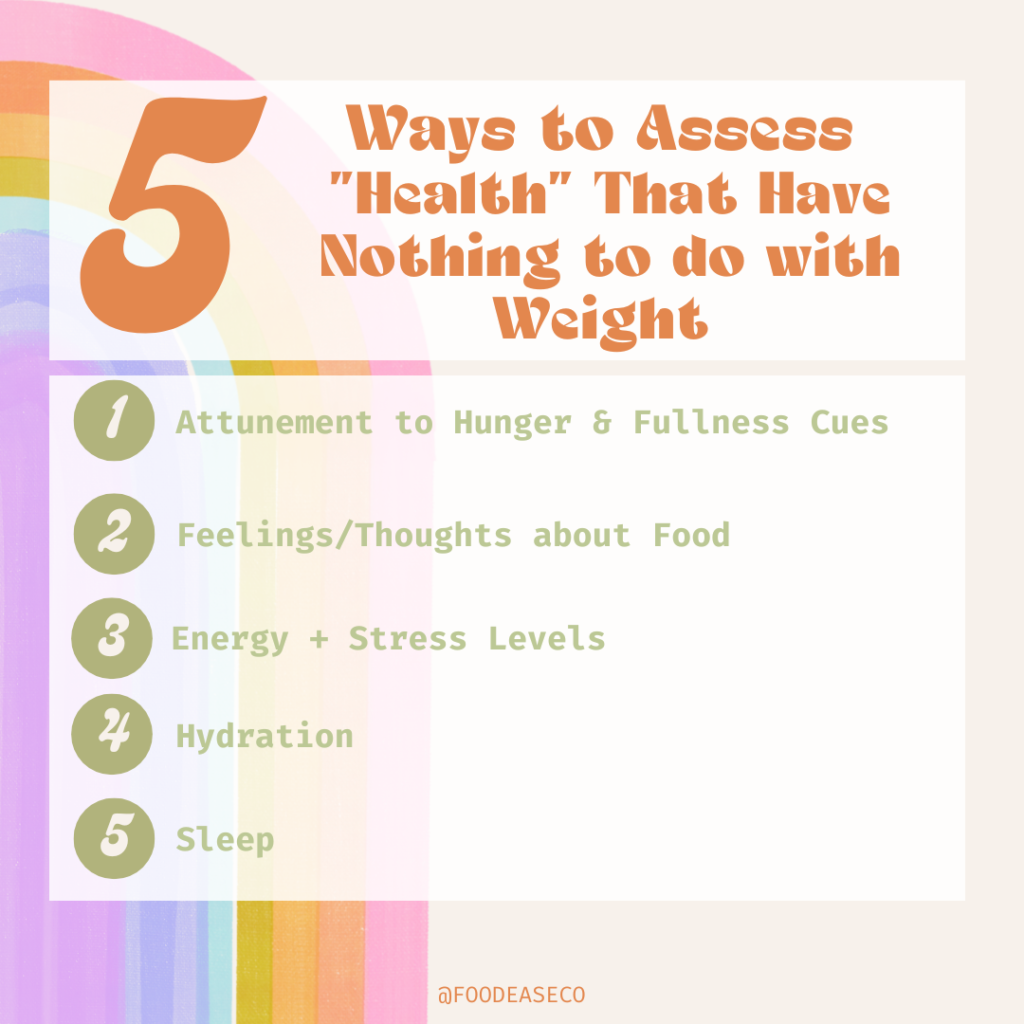Ways to Assess Health Aside From Weight

Introduction
Last week we discussed how to navigate out of range lab values and to not let them determine your health or worth. This week we are continuing with the theme of not letting numbers determine your health and providing other ways of determining health that cannot be categorized by a simple number.
Diet Culture Ways of “Assessing Health” (AKA how NOT to assess health)
- Weight: commonly obtained to calculate BMI. When stuck in dieting we often have a number in our heads that we would like to weigh OR we are constantly weighing ourselves to track weight loss. Weight loss is often celebrated on social media and in real life. Celebrating weight loss can be very harmful when you do not know the source of the loss. Weight loss ≠ health!
- BMI: is commonly used as an indicator of health in many healthcare settings to determine an individual’s health. However, we know that BMI is NOT a good indicator of health, and that BMI contradicts with the theory of our set point weight. BMI does not take into account any other factors of a person’s individual life except for height and weight therefore should not be used as an indicator of health.
- Step Count: ever heard of the 10000 steps in a day saying? I know I have fallen into the trap of feeling the need to walk 10000 steps a day and going out of my way to do so. When in reality walking is not the holy grail of exercise although it is often presented as so. There are so many other ways to participate in joyful movement aside from walking. Walking 10000 steps a day does not make you any healthier than someone who walks 0.
- Counting Calories: Diet culture enforces this belief that we must eat the exact same number of calories every day regardless of the fact that our bodies energy needs fluctuate daily. Eating as little calories as possible is often glorified on social media for example in the “What I Eat in a Day Videos” which normally show little to no food in a person’s day.
So now you have a good idea of ways NOT to assess your health that have often been influenced by diet culture. So what ways can you assess your health?
Healthy Ways to Assess Health
- Attunement to Your Hunger and Fullness Cues: you are able to notice when your body feels hungry and honor it AND you are able to eat to comfortable fullness for the most part.
- You Stress Less About Food: You do not constantly think about what you are going to be eating and you simply enjoy eating all foods without labeling them as “good” or “bad”. You are also able to keep all kinds of foods in your house without feeling the need to avoid certain “bad” foods over lack of control.
- Sleep: It is recommended that individuals aim to get ~8 hours of sleep every night. Sleep is super important for your body and keeping it healthy. Sleep allows the body and mind to recharge and strengthens your immune system, lowers your risk for diseases, improves your mood and reduces stress. Adequate sleep improves and maintains your mental and physical health.
- Hydration: Drinking enough water throughout the day is important for body temperature regulation, preventing infections, delivering nutrients to cells in your body, providing lubrication to joints, digesting food, and so much more. You can gauge your level of hydration by paying attention to the color, smell, and frequency of your urine. If it is darker in color and has a strong odor, you may be dehydrated. If you are peeing every couple of hours that may also be a sign of dehydration. Other physical signs of dehydration include headache, fatigue, dry skin, and poor concentration.
- Energy Levels: it is normal to feel tired and need a nap every so often however if you constantly lack energy, have brain fog, and overall feel exhausted every day that may be a sign that there is an underlying health concern happening.
Instead of focusing on definite numeric values such as weight to assess health, focus on changes in your behavior and thoughts. Learning to eat intuitively is a HUGE step towards greater health by practicing healthy behaviors that are sustainable in the long run.
How We Can Help:
Our dietitian collective focuses on health-promoting behaviors from a weight-neutral, Health At Every Size (HAES) approach. If you are interested in getting started with intuitive eating the dietitians at Food Ease Co. can help!Send us an email to schedule a FREE 15-minute discovery call to see if our services could be right for you.
Have a Question?


Do you have any questions or suggestions? Feel free to contact us! Just leave your email here, and we will get back to you shortly.